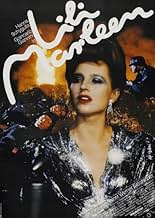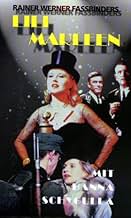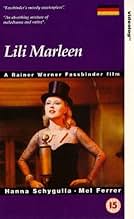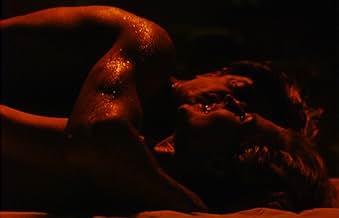ÉVALUATION IMDb
7,1/10
4,6 k
MA NOTE
Ajouter une intrigue dans votre langueIn 1938, a German singer falls in love with a Jewish composer in Zurich, who helps Jews flee Nazi Germany. She wants to help but is forced back to Germany. Her song "Lili Marleen" becomes a ... Tout lireIn 1938, a German singer falls in love with a Jewish composer in Zurich, who helps Jews flee Nazi Germany. She wants to help but is forced back to Germany. Her song "Lili Marleen" becomes a hit with soldiers and the Nazi top brass.In 1938, a German singer falls in love with a Jewish composer in Zurich, who helps Jews flee Nazi Germany. She wants to help but is forced back to Germany. Her song "Lili Marleen" becomes a hit with soldiers and the Nazi top brass.
- Prix
- 1 victoire et 4 nominations au total
Karl-Heinz von Hassel
- Henkel
- (as Karl Heinz von Hassel)
Raúl Gimenez
- Blonsky
- (as Raul Giminez)
Avis en vedette
Jolly good show eld chap - bit of a must see if you like that eld song... I don't know what the makers of this film were thinking, but it was obviously something along the lines of "Dash it all! We appear to got ourselves into a spot of bother here! Too many of the chaps and gels have accents which aren't quite up to par! Well, not to fear - technology to the rescue! I'll just call up the chaps at the club and get them to lend their distinguished Queens English voices to making this film a ripping english yarn about a German singer and a Swiss Jewish music artist..."
Well, the dubbing of an obviously English film with 'upper crust' English accents had me rolling in the aisles, snorting with laughter at some points throughout the film - it all rather distracted from what was really a very good film. Although the editing was a bit choppy in places (1970's relict directing?), the film faily trundles along providing a genteel look at the distractions and hardships WWII had on life in Europe. True, towards the end, one can sympathise with Giancarlo Giannini's 'torture' scene where the Germans lock him up in a room to listen to a couple of lines from the song, 'Lili Marleen' over and over again... How much was Giannini acting and how much was genuine suffering??? But, if you can overlook the dreadful dubbing, this is a good film!
Well, the dubbing of an obviously English film with 'upper crust' English accents had me rolling in the aisles, snorting with laughter at some points throughout the film - it all rather distracted from what was really a very good film. Although the editing was a bit choppy in places (1970's relict directing?), the film faily trundles along providing a genteel look at the distractions and hardships WWII had on life in Europe. True, towards the end, one can sympathise with Giancarlo Giannini's 'torture' scene where the Germans lock him up in a room to listen to a couple of lines from the song, 'Lili Marleen' over and over again... How much was Giannini acting and how much was genuine suffering??? But, if you can overlook the dreadful dubbing, this is a good film!
It is based on the song Lili Marleen, sung by Lale Andersen, and her romance with Rolf Liebermann in the movie Willie and Robert. The film tried to be very impartial in relation to Lale and Nazism, although she helped discreetly, and for Robert, the Allies, however in the end, she ended up surrendering to Nazism, to continue singing, to leave the Black List, had to change her famous song with a military air, she didn't marry Rolf, but kept an eternal friendship, could have done better...
The story of a song in Nazi Germany.. a fiction piece masterly created by Fassbinder. Whilst a stimulating watch, it feels editing could have been tighter at times.
Afterwards you can not get the song 'Lili Marleen' out of y head.
Best to watch the German version instead of the dubbed English one.
Even though Lili Marleen's events take place right before, during and up to the end of World War II, it is a movie centered around people and their feelings in typical Fassbinder fashion.
It is the story of Willie (played by the stunning Hanna Schygulla) and with her the story of Nazi Germany that follows a similar trajectory. She is a German that tries to make a living in Zurich as a singer/cabaret artist and falls in love with Robert (Giancarlo Giannini), a Jew and member of the anti-Nazi resistance camp. His family doesn't approve of their relationship, because she is German/Aryan and make sure they go their separate ways after her deportation. Back in Germany, she must find a way to survive and, seemingly out of nowhere, her song "Lili Marleen" becomes a monumental hit, a source of inspiration and courage for every German soldier, which brings Willie in a tricky spot, as it becomes harder and harder to maintain the balance between collaborating with the Nazis in an artistic level and taking part in the resistance against them all the while hoping for a reunion with Robert which seems more and more unlikely.
An interesting element of the movie is that it presents both sides in a nuanced way, it avoids portraying the Nazis as the one-dimensional caricature villains. It also shows how thin the lines are and how hard it can be to fight prejudice and shake off a social or political stigma.
And of course the song itself deserves its legendary status.
It is the story of Willie (played by the stunning Hanna Schygulla) and with her the story of Nazi Germany that follows a similar trajectory. She is a German that tries to make a living in Zurich as a singer/cabaret artist and falls in love with Robert (Giancarlo Giannini), a Jew and member of the anti-Nazi resistance camp. His family doesn't approve of their relationship, because she is German/Aryan and make sure they go their separate ways after her deportation. Back in Germany, she must find a way to survive and, seemingly out of nowhere, her song "Lili Marleen" becomes a monumental hit, a source of inspiration and courage for every German soldier, which brings Willie in a tricky spot, as it becomes harder and harder to maintain the balance between collaborating with the Nazis in an artistic level and taking part in the resistance against them all the while hoping for a reunion with Robert which seems more and more unlikely.
An interesting element of the movie is that it presents both sides in a nuanced way, it avoids portraying the Nazis as the one-dimensional caricature villains. It also shows how thin the lines are and how hard it can be to fight prejudice and shake off a social or political stigma.
And of course the song itself deserves its legendary status.
Rainer Werner Fassbinder is an important (or maybe the most important) director of the "Neue Deutsche Welle" of the seventies and eighties.
Until now I had seen only one of his films ("Angst essen Seele auf", 1974), preferring another director of the "Neue Deutsche Welle" (Werner Herzog) instead.
Also with other filmmovements I often prefer another director above the leading figure. With the French "Nouvelle vague" for example I prefer Claude Chabrol above Jean Luc Godard.
Nevertheless only one film of such an important director felt as too little to me and I decided to watch some more if the opportunity arose.
The first opportunity was "Lili Marleen" (1981) and maybe this was not the best oppurtunity. "Lily Marleen" is from the later stages of Fassbinder's career. He was already a renowned director and for this production had the disposal over a big budget. His aim was a film that would also perform well at the American box office. The film was recorded in English but later dubbed in German when the American success failed to materialize.
The story is about the female singer Willie (Hanna Schygulla) who is very successful in Nazi circles, being with the resistance in her private life. As such the story has similarities with "Black book" (2006, Paul Verhoeven).
The song Willie has success with is "Lili Marleen", which was a real existing song during the Second World War performed by Lale Andersen. Also Marlene Dietrich would occasionaly perform this song.
In my opinion "Lili Marleen" is a rather conventional movie according to Fassbinder standards (or at least as I expect Fassbinder standards to be). The most striking scenes are those in which Willie is performing her song. These scenes are edited with both images of soldiers resting in their trenches and very brutal war violence. These scenes are however more theatrical than shocking.
Until now I had seen only one of his films ("Angst essen Seele auf", 1974), preferring another director of the "Neue Deutsche Welle" (Werner Herzog) instead.
Also with other filmmovements I often prefer another director above the leading figure. With the French "Nouvelle vague" for example I prefer Claude Chabrol above Jean Luc Godard.
Nevertheless only one film of such an important director felt as too little to me and I decided to watch some more if the opportunity arose.
The first opportunity was "Lili Marleen" (1981) and maybe this was not the best oppurtunity. "Lily Marleen" is from the later stages of Fassbinder's career. He was already a renowned director and for this production had the disposal over a big budget. His aim was a film that would also perform well at the American box office. The film was recorded in English but later dubbed in German when the American success failed to materialize.
The story is about the female singer Willie (Hanna Schygulla) who is very successful in Nazi circles, being with the resistance in her private life. As such the story has similarities with "Black book" (2006, Paul Verhoeven).
The song Willie has success with is "Lili Marleen", which was a real existing song during the Second World War performed by Lale Andersen. Also Marlene Dietrich would occasionaly perform this song.
In my opinion "Lili Marleen" is a rather conventional movie according to Fassbinder standards (or at least as I expect Fassbinder standards to be). The most striking scenes are those in which Willie is performing her song. These scenes are edited with both images of soldiers resting in their trenches and very brutal war violence. These scenes are however more theatrical than shocking.
Le saviez-vous
- AnecdotesShot in English for American distribution; later dubbed in German
- GaffesKaufmann, the German officer who arrests Robert on the train, wears the uniform of an SS-Gruppenfuhrer (General) - it is highly unlikely that an SS General of such rank would be checking identity papers at random on a train.
- ConnexionsFeatured in Century of Cinema: Die Nacht der Regisseure (1995)
- Bandes originalesLili Marleen
(German Version)
(based on a poem from the 1915 book "Die kleine Hafenorgel" by Hans Leip)
Music By Norbert Schultze,
Vocals Hanna Schygulla
(p) 1981 Schlicht Musikverlag, Phonogram, GmbH, DRG Records, Inc., Philips
© Metropolis Records
Published By Brampton Music Ltd., Chappell Music Ltd., Peter Maurice Music,
EMI Music
Meilleurs choix
Connectez-vous pour évaluer et surveiller les recommandations personnalisées
- How long is Lili Marleen?Propulsé par Alexa
Détails
- Date de sortie
- Pays d’origine
- Langues
- Aussi connu sous le nom de
- La vida íntima de Lili Marleen
- Lieux de tournage
- sociétés de production
- Consultez plus de crédits d'entreprise sur IMDbPro
Box-office
- Budget
- 10 500 000 DEM (estimation)
- Brut – États-Unis et Canada
- 8 144 $ US
- Fin de semaine d'ouverture – États-Unis et Canada
- 11 623 $ US
- 16 févr. 2003
- Brut – à l'échelle mondiale
- 8 158 $ US
- Durée
- 2h(120 min)
- Mixage
- Rapport de forme
- 1.66 : 1
Contribuer à cette page
Suggérer une modification ou ajouter du contenu manquant


































